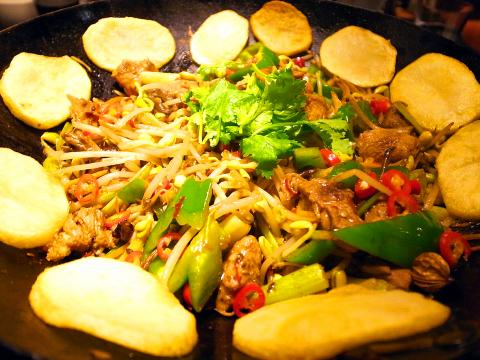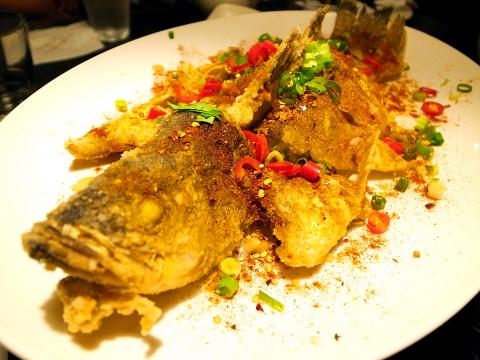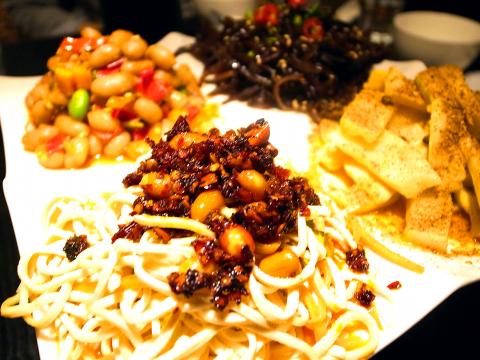Dining at Oriental Cuisine is like taking a crash course in Guizhou food, thanks to meticulous proprietor and chef David Yeh (葉國憲), who trekked to the mountainous region on the Yunnan-Guizhou Plateau in 2008 to study the locale’s style of Chinese cooking, which is celebrated for its complex spiciness and vinegary flavors.
Yeh is possibly the most diligent restaurateur I have ever encountered. On a recent visit, the neatly dressed chef not only took his time to greet our group of six and make recommendations while helming the kitchen, he also presented each dish and genially explained their origin and ingredients.
According to him, since the weather in Guizhou is often humid and chilly, the locals have long munched on a wide variety of spicy foods to stave off the cold.

Photo: Ho Yi, Taipei Times
Depending on the type of hot pepper used and how it is prepared and mixed with other spices, Guizhou cuisine has more than a dozen categories of spiciness, including sour spicy, (酸辣), oily spicy (油辣) and grilled spicy (糊辣).
For first-time diners, the assorted appetizer plate (四喜拼盤, NT$200 and NT$360) is a good starting point. Made with red chili that is first stir-fried with garlic and ginger, then tossed with peppercorns (花椒), the serving of oily spicy bamboo shoots (大紅袍油辣香筍) produces a tongue-tingling numbing sensation.
The pickled chili with peanuts (糟辣浸花生) showcases the pleasantly unique tang of fermented chili, while the vinegary black jelly fungus (醋溜黑木耳) refreshes the taste buds with its lovely tartness.

Photo: Ho Yi, Taipei Times
But don’t be fooled by the appetizers’ deceivingly simple appearance. My dining companions and I were all impressed by their nuanced flavors.
A delicacy traditionally cooked on special occasions, Miao chicken dry pot (苗寨乾鍋雞, NT$350 and NT$650) evolved from the iron pots that the region’s villagers used to cook with over fire pits.
To please local palates, Yeh’s rendition uses less oil and more vegetables — green pepper, celery, bean sprouts, slices of potato. The dish’s spiciness increases as the vegetables and chicken release their juices, which condense and thicken.

Photo: Ho Yi, Taipei Times
Sourness is another characteristic of Guizhou cuisine, and a good example is the Miao sour fish soup (苗家酸湯魚, NT$380 and NT$680). Using a light, sour broth made from fermented rice, the dish combines tomatoes and fermented chili to give sea perch an exciting kick.
Halfway through our evening spread, my dining partners and I started to plan our next visit to sample other signature dishes on the restaurant’s extensive menu. Topping our list is the sweat-inducing chicken (鎮店盜汗雞, NT$1,680), which requires eight hours of meticulous preparation to transform a clay pot filled with chicken and Chinese herbs into a piping hot pot of chicken soup, all without the addition of even a drop of water. The dish needs to be ordered at least one day in advance.
Eating at the two-story establishment is a comfortable experience. With a pleasant outdoor dining area on the balcony, the restaurant is very well kept and spacious, while the air is lightly scented with Chinese herbs and spices.
Located three minutes walk from Dazhi MRT Station (大直捷運站) exit No. 1, Oriental Cuisine is tucked away in a quiet alley adjacent to the park next to the main entrance of Shih Chien University (實踐大學).

In Taiwan there are two economies: the shiny high tech export economy epitomized by Taiwan Semiconductor Manufacturing Co (TSMC, 台積電) and its outsized effect on global supply chains, and the domestic economy, driven by construction and powered by flows of gravel, sand and government contracts. The latter supports the former: we can have an economy without TSMC, but we can’t have one without construction. The labor shortage has heavily impacted public construction in Taiwan. For example, the first phase of the MRT Wanda Line in Taipei, originally slated for next year, has been pushed back to 2027. The government

July 22 to July 28 The Love River’s (愛河) four-decade run as the host of Kaohsiung’s annual dragon boat races came to an abrupt end in 1971 — the once pristine waterway had become too polluted. The 1970 event was infamous for the putrid stench permeating the air, exacerbated by contestants splashing water and sludge onto the shore and even the onlookers. The relocation of the festivities officially marked the “death” of the river, whose condition had rapidly deteriorated during the previous decade. The myriad factories upstream were only partly to blame; as Kaohsiung’s population boomed in the 1960s, all household

Allegations of corruption against three heavyweight politicians from the three major parties are big in the news now. On Wednesday, prosecutors indicted Hsinchu County Commissioner Yang Wen-ke (楊文科) of the Chinese Nationalist Party (KMT), a judgment is expected this week in the case involving Hsinchu Mayor Ann Kao (高虹安) of the Taiwan People’s Party (TPP) and former deputy premier and Taoyuan Mayor Cheng Wen-tsan (鄭文燦) of the Democratic Progressive Party (DPP) is being held incommunicado in prison. Unlike the other two cases, Cheng’s case has generated considerable speculation, rumors, suspicions and conspiracy theories from both the pan-blue and pan-green camps.

Stepping inside Waley Art (水谷藝術) in Taipei’s historic Wanhua District (萬華區) one leaves the motorcycle growl and air-conditioner purr of the street and enters a very different sonic realm. Speakers hiss, machines whir and objects chime from all five floors of the shophouse-turned- contemporary art gallery (including the basement). “It’s a bit of a metaphor, the stacking of gallery floors is like the layering of sounds,” observes Australian conceptual artist Samuel Beilby, whose audio installation HZ & Machinic Paragenesis occupies the ground floor of the gallery space. He’s not wrong. Put ‘em in a Box (我們把它都裝在一個盒子裡), which runs until Aug. 18, invites